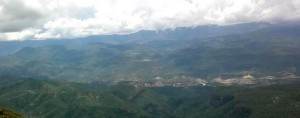I’m halfway through my journey as a Peacebuilder in Mexico, and every week I’ve come to re-discover the land I thought I knew. It’s one thing to be a native of Mexico, it’s another to be a foreigner in Mexico, and still another to see Mexico and the U.S. as “home,” even when I feel like a native of and a foreigner in, both.
Let me explain.
The phrase designated to identify me by census questionnaires, law school applications, insurance agents and many other U.S. institutions is “Mexican-American.” “Mexican-American,” has always seemed to me to be a superficial oversimplification of how a person born in the U.S. might identify themselves. It’s hard enough for a person to find an identity, but doing so under this classification only multiplies the obstacles. Needless to say, I grew up confused about my place in school and U.S. society in general, not to mention how school and society saw me. In my journey to find an identity, all that was clear was that I was never just considered “American,” hence I never just felt “American,” though I was born, raised and educated in the U.S.
Crossing the border didn’t make my understanding any clearer. My parents are from a small village, Villa Guerrero, in Jalisco, Mexico, a place I’ve visited for different lengths of time just about every year since I was a child. A place filled with family, friends and memories. I was raised on Mexican traditions and culture, I speak fluent Spanish (by that I mean that people in D.F. often don’t even realize I wasn’t born in Mexico), I’m very invested in the political, social and economic progress of the country, and do in fact also call Mexico “home”. Yet, natives identify me as a “gringa.”
Today I have much to learn about myself and my identity, and though I do not call myself “Mexican-American,” I live happy and passionately as a hybrid. My dual identity provides me the ability to understand, adapt and belong to two very different countries. It facilitates my ability see things natives and foreigners of each country may not understand. As a Peacebuilder, however, I have come to see things that had escaped me; that natives and foreigners might see and understand more easily because of their long or short standing relationship with the country.
What do I mean by this? Water.
It’s not until I became a Peacebuilder that I began to see the role that water played in the village I’d known all my life. Water had surrounded me in one way or another since I was kid and now I realize I’ve known about water in Mexico for a very long time. My father and his family own ranches in Jalisco. Often he’d take me along for a ride to see the cattle, the lands, the horses, instilling in me the importance of water in keeping them healthy. He’d show me the river that nourished his crops and divided his land from others; the niches dug out to drain water and guide it to where it was most needed; the wells that collected the water supplied to the land; the water holes that kept the cattle hydrated; and the lake that provided water to the village’s inhabitants. Every visit, water was a topic of conversation and there was never enough of it.
Until this point I’d never much paid attention to the issue of water in Villa. I’d never felt its scarcity. I’d always had it when I needed it. That tends to be the norm though, doesn’t it? An issue often doesn’t come alive for someone, until they’re affected by it in one way or another. In the case of water, most people don’t worry about until they don’t have it. Now I see it, care about it, and attempt to do my part to conserve it. I feel guilty for my lack of awareness all this time.
This week I asked my mother about water in Villa, something I’d never done before. She responded, “it’s rained a lot lately” and that because of it Villa was beautiful. Now I understand this simple response in a new light. Villa is beautiful because it’s not suffering from a lack of water: it’s inhabitants have enough to drink and use for daily chores, the animals it breeds and maintains to survive are healthy because they’re hydrated, and because the soil is nourished it’s crops may flourish. Now I realize that when the answer is, “there is little water, it hasn’t rained,” the reality will be far more complicated.


